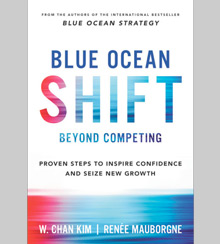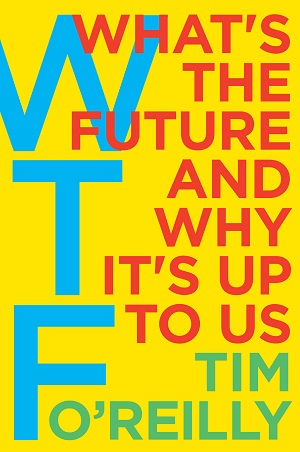 strategy + business, October 25, 2017
strategy + business, October 25, 2017
by Theodore Kinni
INSEAD professors W. Chan Kim and Renée Mauborgne hit the thought leadership lottery with the idea of blue oceans. Their 2005 book, Blue Ocean Strategy, Harvard Business School Press, which described the advantages of setting sail for new “blue ocean” markets devoid of competitors versus battling for percentage points of share in mature, commoditized “red ocean” markets, sold more than 3.5 million copies. The two professors, having found their own blue ocean, quickly ascended to the pinnacle of strategic consulting: INSEAD presented them with an institute and built blue ocean strategy into its MBA curriculum. Given all this success, the only truly surprising thing is that it took 12 years for Kim and Mauborgne to publish a follow-up.
For the most part, Blue Ocean Shift proves to be worth the wait. It is a practical, well-written guide to finding and exploiting blue ocean markets, informed by the experiences of companies and other organizations that have chosen to seek them out rather than compete toe-to-toe in established markets. Read the rest here.
Wednesday, October 25, 2017
Do-It-Yourself Oceaneering
Posted by
Theodore Kinni
at
9:09 AM
0
comments
![]()
Labels: bizbook review, books, change management, corporate success, decision making, entrepreneurship, innovation, personal success, strategy+business
Monday, October 16, 2017
Why Entrepreneurs Should Care Less About Disrupting and More About Creating
MIT Sloan Management Review, October 16, 2017
Posted by
Theodore Kinni
at
3:10 PM
0
comments
![]()
Labels: books, corporate success, entrepreneurship, leadership, personal success, work
Sunday, October 15, 2017
How to Keep More of What You Make
Learned a lot about how to shelter wealth in private businesses while lending an editorial hand here. Read the rest at https://lnkd.in/gEFvJpu
Posted by
Theodore Kinni
at
2:41 PM
0
comments
![]()
Labels: articles to ponder, corporate success, leadership, management, personal success
Wednesday, October 11, 2017
Take a Timeout, Leaders
 strategy+business, October 11, 2017
strategy+business, October 11, 2017by Theodore Kinni
On July 4, 1845, Henry David Thoreau went to the woods to live deliberately. After spending two years, two months, and two days in a 150-square-foot cabin that he built himself for $28.12 and a halfpenny, Thoreau had worked out the gist of the transcendentalist classic Walden; or, Life in the Woods. In it, he wrote, “I never found the companion that was as companionable as solitude.”
CEOs and other leaders would do well to get on companionable terms with solitude, too, according to first-time authors Raymond M. Kethledge, a U.S. Court of Appeals judge, and Michael S. Erwin, a leadership development consultant and assistant professor at West Point. Leaders don’t necessarily have to get off the grid and live in a hut for two years. But in Lead Yourself First, the authors make an extended argument that leaders should reserve some alone time “to find clarity, creativity, emotional balance, and moral courage.” They illustrate their thesis with numerous examples. Read the rest here.
Posted by
Theodore Kinni
at
10:25 AM
0
comments
![]()
Labels: bizbook review, books, corporate success, creativity, decision making, entrepreneurship, leadership, management, personal success, strategy+business
Tuesday, October 3, 2017
Three Career Tips for the Purposeless
In which, I vent my frustration with the fetishization of purpose...
LinkedIn Pulse, October 3, 2017

“I’m not here to give you the standard commencement about finding your purpose. We’re millennials. We’ll try to do that instinctively,” Mark Zuckerberg told Harvard’s Class of 2017. “The challenge for our generation is creating a world where everyone has a sense of purpose.”
Baloney. A sense of purpose is like an appendix. If you’ve got one, good for you. If you don’t, you’re not missing anything important.
I’ve always been purposeless. As a kid, I kinda worried about it. I thought I was missing something essential because all I wanted to be was a New Jersey Lottery winner. (In those days, the grand prize was a cool million. Pretax. Woo-hoo!)
But getting a purpose was never a burning issue for me. Getting a job was far more important. I needed money—mainly because the only thing my parents ever agreed on was that one kid wasn’t enough.
Sans purpose, it did take me a long time—15 years—to find work that worked for me. But I learned some lessons along the way. I offer them here as shortcuts to everyone else who drew a blank ticket in the purpose lottery. Read the rest here.
Posted by
Theodore Kinni
at
8:41 AM
0
comments
![]()
Labels: articles to ponder, corporate life, personal success, work
















